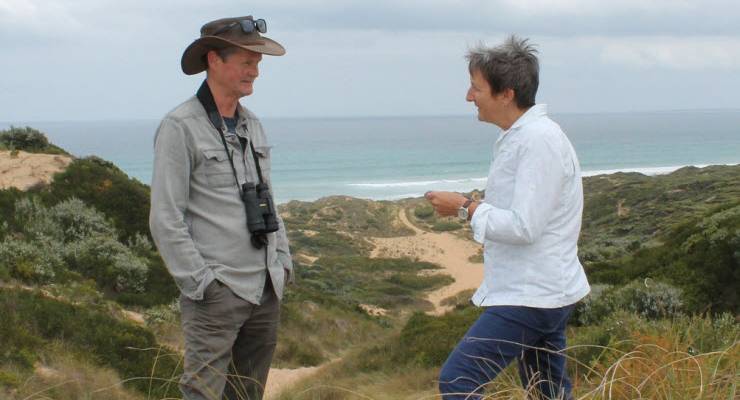
As we know, Facebook last week took aim at the big players in the Australian media and ended up wounding dozens of little ones. My news website, The Terrier, based in Warrnambool in regional Victoria, was hit right in the bum by the shrapnel.
Bang! The Terrier was wiped off Facebook overnight and the 5300-plus followers I have so diligently built up these past three years evaporated.
I quickly started a “Terrier florist” page on Facebook, just to maintain some oxygen. I’m not pushing up the daisies just yet — and besides Facebook has now seen the error of its ways. We’re back.
I am, however, mulling over what is a sustainable and realistic way to get through a bigger issue: what Mark Zuckerberg has exposed is the soft underbelly of hyper-local media voices like The Terrier.
We are the little tackers trying to keep independent, public interest journalism alive in regional corners of Australia like Warrnambool and Cygnet and Manning River and Naracoorte.
It’s an exhausting battle with multiple fronts that go beyond our reliance on social media as a platform from which to be heard and shared.
It also includes our vulnerability in defamation claims, another of which landed literally on my doorstep just days before Facebook pulled the pin.
It’s my fourth claim in 18 months. All relate to my ongoing investigation into an aged care facility.
I must respond to these claims, irrespective of whether they can be substantiated. Fortunately I have insurance via the Media Entertainment and Arts Alliance, but that does not mean my legal representation is free: each action attracts a $2000 excess.
This leaves new hyper-locals like The Terrier open to “bullying by bank balance” whereby a cashed-up organisation or individual can continue to launch civil actions for the cost of a legal letter.
For those hoping to shut down an investigative journalist, it is a very cheap and effective silencer.
Google, Facebook, and the federal government have been fighting over money that many hyper-locals will never see, because under the new media code, to even negotiate with Facebook and the like, a media organisation must make at least $150,000 a year.
In the past two years, I have made nowhere near that, even as The Terrier has proven that regional readers are desperate for investigative journalism that is not afraid to challenge those in charge.
But desperation is not enough.
I had hoped the government might use the code to launch a public interest journalism fund that all media outlets could apply for, no matter how big or small, provided that outlet could prove it had journalistic runs on the board.
The Terrier has some significant runs, including the launch of an inquiry by the Victorian Ombudsman into credit card abuse at my local council and the complete replacement of that council in last year’s October elections.
Again, it is not enough. There is still no fund. The cavalry is yet to crest the horizon.
I keep hanging in there, because this fight is much bigger than Facebook and much broader than Google and strikes at the heart of whether hyper-local, public interest, and investigative journalism really does have a future.
I feel we are now standing at that crossroad of yes or no.
As it sits, the legacy media companies stand to get stronger, yet with no guarantees their regional newsrooms will get bigger. Meanwhile, the smaller voices stand to be crushed.
Last week was a whack that I didn’t see coming, and it hurt. But terriers are tough.
We open “florist shops” on Facebook, we take a little time to smell the roses, and we keep working with those who want us to survive.







Good article. These tiny local news organisations should be getting support, or at least a level playing field, but the big boys would prefer to crush them all.
“to even negotiate with Facebook and the like, a media organisation must make at least $150,000 a year.”
I have no idea if this is at all realistic, but could small players combine, perhaps in a cooperative / mutual organisation that would still leave them each operating with effective independence, and so meet the turnover threshold?
Hi SSR, Now that all of the “hyper-locals” are finding each other and connecting, there is a greater likelihood of a collective push. I am also heartened by groups like the MEAA and the Judith Neilson Institute for Journalism and Ideas adding their weight to this fight for the “little tackers”. With their leadership, we may yet find a place at the table. I hope so.
It’s all about presentation. Call yourself a sporting club and your paper a “club newsletter” and be in a marginal seat, and watch the money flooding in.
“I had hoped the government might use the code to launch a public interest journalism fund that all media outlets could apply for, no matter how big or small, provided that outlet could prove it had journalistic runs on the board.”
ha ha ha ha ha ha ha ha
Big Media in this country has been trying to kill off the smaller, more local (and vocal) media organizations for some years. Keep up the good work.
Interesting that Tory Shepherd did a Crikey article a couple of days ago. Are the better Advertiser journos migrating to the alternative media?
Yes, and Tory Shepherd was far more directly critical of Morrison than she ever was on Insiders. If she keeps that up, I’ll be interested to see further Crikey articles from her.
I thought I would mention that “bullying by bank balance” has been known as a SLAPP suit for many years. “Strategic Law Suit Against Public Participation”.
https://en.wikipedia.org/wiki/Strategic_lawsuit_against_public_participation
Many jurisdictions have legislation that prohibits or punishes SLAPP suits, but not Australia, except for the ACT.